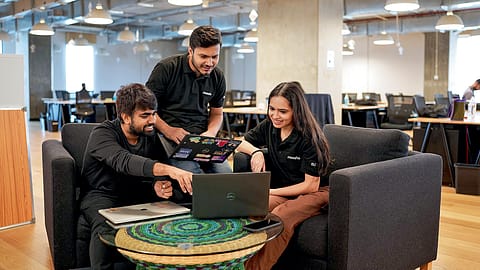Meesho’s Top Priority: Well-being
Employee well-being, an important milestone for employers of the future, has been at the centre of Meesho’s strategy since its launch in 2015.

This story belongs to the Fortune India Magazine April 2023 issue.
NANDAN KUMAR (name changed) joined Meesho in 2022. Within seven days, he was diagnosed with a severe illness. The company put Kumar on paid leave for four months during which he underwent treatment, got cured and resumed work. “We could support him thanks to our infinite leave policy. He is now hale and hearty and works as an important team member of the HR charter,” says Ashish Kumar Singh, chief HR officer, Meesho.
Employee well-being, an important milestone for employers of the future, has been at the centre of Meesho’s strategy since its launch in 2015. “I have seen organisations talk about being people-centric, but end up being money-centric and fuss over employee productivity. Founders at Meesho are aligned to being an employee-centric organisation, which makes my job to experiment with such policies easier,” says Singh.
There’s also the impact the company is making in society. While the e-commerce revolution made life easier for the top strata in the ecosystem, small vendors and distributors remained out of the ambit. “The founders’ vision to democratise Internet commerce and enable small sellers and women entrepreneurs sell online is inspiring,” says Singh.
Meesho’s seller base has grown to nearly 10 lakh. In 2022, the company witnessed an 80% rise in seller registrations and a 2.75xYoY growth in seller transactions on its platform.
Communication, however, remains key.
Meesho conducts a lot of ‘pulse’ surveys to hear employees’ feedback every quarter. “For example, people requested us to treat maternity and paternity leave in the light of the primary caregiver. If a male employee is the primary caregiver, he could be entitled to a longer leave, so it is not restricted to women employees. We call it ‘gender neutral parental leave’ policy,” says Singh. Also, a lot of people adopt children these days. “One of our female employees adopted a two-month-old child. We gave her six-month maternity leave,” says Singh.
Employee feedback has also helped Singh come up with the ‘reset and recharge’ policy. “All employees get an 11-day break post the annual flagship festive sale event that concludes with Holi,” says Singh. Holidays, too, are decided at the beginning of the year based on employee feedback.
More Stories from this Issue
Talent Acquisition
Unlike a lot of its counterparts, Meesho doesn’t look for all-rounders. The company measures competencies on a scale of one to four, and if one gets a four on four in one and less in others, he/she is good to go. “One needs to excel at one skill. It doesn’t matter if you are not good in others. We take care of it,” says Singh.
As far as performance appraisal is concerned, it is about two things — the ability to help others excel, and, a 360-degree feedback. Appraisals depend on feedback from different managers. A calibration committee evaluates each employee. “One manager could be tough while the other lenient. The committee helps in removing these biases,” says Singh.
The company’s ESOP policy, which covers 70% of employees, is also quite attractive. The MeeSOPS programme helps employees purchase ESOPs from their salary, and around 30% of employees have participated to date. Employees also get discounts on the market value of ESOPs depending on their tenure in the firm.
(INR CR)
The company offers insurance benefits such as a base sum-insured of ₹6 lakh, which is above the market benchmark of ₹3-5 lakh. The maternity & C-section coverage is ₹1 lakh. Employees also get an additional top-up of ₹20 lakh over the base cover. There are unique covers such as LGBTQ/same sex partner/live-in partner coverage, infertility treatment cover up to ₹1.5 lakh, psychiatric treatments, long-term physiotherapy cover and HIV coverage, among others. The company has 1,800-plus full-time employees, a YoY growth of 110% (2022), and 190% (2021).
Meesho is eyeing an IPO after two years once it becomes EBITDA positive. A growth in size also comes with the challenge of maintaining the vibrant start-up culture. “As start-ups scale up, they become bureaucratic in nature. We are trying to make sure we still remain the nimble start-up we have been thus far,” concludes Singh.